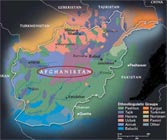Not much to show after eight years of Karzai
 Kabul - It was a key moment of change: At Afghanistan's first free presidential election in October 2004, long queues snaked in front of the polling stations in Kabul, and the hope for freedom and a better future was palpable.
Kabul - It was a key moment of change: At Afghanistan's first free presidential election in October 2004, long queues snaked in front of the polling stations in Kabul, and the hope for freedom and a better future was palpable.
A majority voted for then-interim president Hamid Karzai. At his swearing-in ceremony two months later, he said, "We have now left a hard and dark past behind us, and today, we are opening a new chapter in our history."
The optimism was misplaced. The situation is worse now than at any point since the 2001 overthrow of the Taliban, but Karzai is still the frontrunner in the presidential election scheduled for August 20.
At his inauguration five years ago, the president, who received strong US backing, said he would stop the cultivation of opium and disarm the militias during his term in office. He also promised to tackle poverty and corruption, reform the government, rebuild the country's shattered infrastructure and continue the fight against terrorism.
But a look at the achievements of his eight-year presidency - including his time as interim president - is sobering.
Under Karzai, Afghanistan has again become the world's largest producer of raw opium.
Poverty has not been eradicated either. Afghanistan has achieved high rates of economic growth for years - albeit from a low base - but millions of Afghans struggle just to survive, and jobs are in short supply.
Afghanistan also placed 176th on Transparency International's corruption index of 180 countries. Administrative reforms only happen slowly, and there is little legal stability.
In addition, Karzai has given jobs to powerful warlords instead of depriving them of power.
For one, he has chosen the warlord Mohammad Kasim Fahim - a former prominent member of the Northern Alliance whom human rights organizations accused of war crimes - as his running mate.
Although that selection dealt a blow to the Northern Alliance, which is pitting former foreign minister Abdullah Abdullah against Karzai in the presidential election, Karzai has duped not only the international community but also many Afghans who would like to see warlords like Fahim in jail rather than sticking their noses in the public trough.
Slow progress has been seen in Afghanistan's reconstruction as well. The population's impatience is growing, and dissatisfied Afghans are easy targets for Taliban recruiters.
Despite the constantly rising number of foreign and Afghan security forces, the militants, who are warning Afghans not to take part in next week's election, have most certainly not been defeated.
About 100,000 foreign soldiers are deployed in Afghanistan, several times the number at the start of the operation. Last month, more foreign troops were killed than in any month since the overthrow of the Taliban, and opposition to the deployment is growing in many countries that supply those troops.
At the same time, increasing numbers of Afghans see the foreign forces as occupiers. One of the reasons is the rising number of civilian casualties in military operations.
Although the United Nations said militants were responsible for most of the more than 1,000 conflict-related civilian deaths in the first half of the year, foreign and Afghan troops were blamed for more than 30 per cent of them.
However, Karzai does not bear sole blame for the poor state of his nation eight years after the Taliban was driven from power, said Thomas Ruttig, the co-director of the Afghanistan Analysts Network, a non-profit research group.
"The international community bears half the responsibility," he said.
It has coordinated the reconstruction work badly, which slowed the process down, he said. Warnings that the government had to stem corruption were not enforced, he added. Instead of disarming the militias, the US military used them in the fight against the Taliban, Ruttig said, adding that European members of NATO in particular waited too long before increasing their troop contingents.
The countries involved in Afghanistan have also not covered themselves in glory in combatting drugs, he said.
Two years ago, Karzai complained, "Another important issue is that there is no effective coordination among the international community. They just don't have the coordination that is required. One says one thing, and the other says the opposite. One says, 'Destroy it,' the other says 'Don't.' One says, 'They do it,' the other blames, 'No, they do it.' For all of this, we are held responsible."
The international community in Afghanistan still has no unified stance on fighting the cultivation and trade of drugs, nor have the Afghans prosecuted a single drug baron, many of whom are thought to have connections in the government.
Despite broken promises and only little success, Karzai can still count on the support of many Pashtuns, the country's largest ethnic group and the one to which he belongs.
And Karzai has managed to get competing candidates with good prospects to support him. It is likely they have been promised posts in his government if he wins.
The two main challengers are not radical alternatives to the incumbent: Abdullah was earlier a member of Karzai's cabinet as was former finance minister Ashraf Ghani.
The lack of an alternative is a big problem," Afghanistan expert Ruttig said. "There is a lot of evidence that Karzai will succeed."
But Ruttig said he believes the prevailing mood favours change. If Abdullah, Ghani and the minor candidates together get enough votes to deny Karzai an absolute majority, then a second round of voting would take place.
"In the second round, it would come to a polarization, and then how the voters will behave cannot be predicted," Ruttig said. "The election could still be exciting." (dpa)